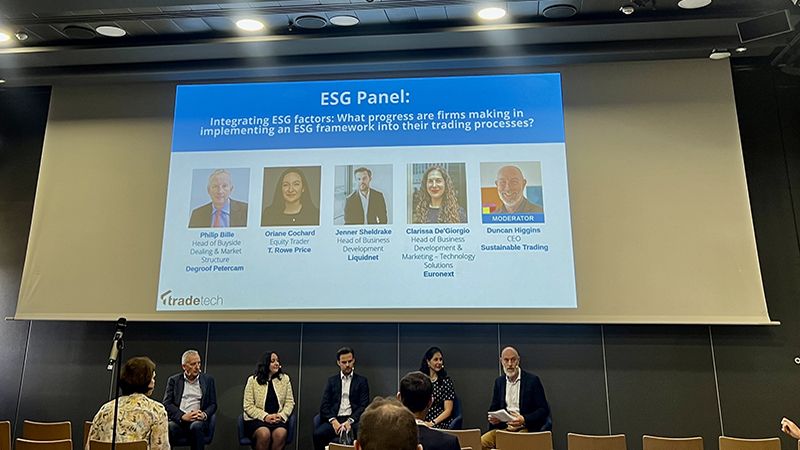Financial services firms need to accelerate efforts to attract and retain young talent as Generation Z are increasingly turning to “tech giants companies” for work, participants in the ESG panel of the TradeTech 2024 conference in Paris revealed.
During the panel called Integrating ESG Factors: What progress are firms making in implementing an ESG framework into their trading processes?, moderated by Duncan Higgins, chief executive of Sustainable Trading, panellists explored the changes taking place to attract and maintain talent within firms.
The panellists were:
- Clarissa De’Giorgio, head of business development and marketing – technology solutions at Euronext
- Jenner Sheldrake, head of business development at Liquidnet
- Oriane Cochard, equity trader at T Rowe Price
- Philip Bille, head of buyside dealing and market structure at Degroof Petercam
The discussion centred on the employment processes within firms and why integrating ESG within companies attracts and maintains young talent.
Clarissa De’Giorgio, head of business development and marketing – technology solutions at Euronext, said that firms must support the professional development of Generation Z in order to attract talent to the financial sector.
“EY have recently published a study revealing by 2025, 27% of the workforce will be composed of Generation Z. If you compare the mentalities of Generation Z versus the boomers and millennials, there is a big disconnect. As we interview more interns and graduates who are looking to enter the financial sector, the first thing they ask is what is your work-from-home policy? What is your firm’s standpoint in terms of ESG policy? What are you doing as a firm to tackle climate crisis?
“The financial sector must find a way to keep on attracting top talent because it faces stiff competition from tech giant companies like Amazon. But as we enter this digital transformation phase, it is a great way to attract younger talent who are looking to create their mark within their work.”
Jenner Sheldrake, head of business development at Liquidnet, added: “When you look at the talent pipeline, what you think would be their first question 10 years ago is not the same today. Now it is about flexibility. We lost out on our number one intern because they went to Meta. This is something that has really changed. You go to lots of career fairs and the tech stands are busier than the financial stands.
“We need to improve the industry to continue to bring talent in because that’s what the broader business case for ESG sets out.”
Higgins asked Sheldrake how Liquidnet is incorporating ESG into their firm and what changes are taking place.
“What we’ve tried to do is separate the big corporate, long term strategic changes, and then bring that down to the level of the trading desk and what individuals can do. That’s where we’ve been trying to make a difference. And it’s small things.
“It’s no different than going to a meeting and bringing iPads rather than paper printouts. Or, getting the underground to a meeting rather than a taxi. It might be a really small change, but it forces people to think and work more consciously.”
Meanwhile, Oriane Cochard, equity trader at T Rowe Price, spoke about how the firm is “getting ready for the future.”
She said: “I’m very optimistic of what we’ve accomplished already. One of our objectives is trying to implement more flexibility into our working hours. We’re a very solid team which means we can work from home one day a week. But to me flexibility is not just about working from home, but if you need 30 minutes away from the desk, you can take it.
“It’s also looking at the company’s recruiting policies, having time off the desk volunteer in the community or be part of broader initiatives within the firm.”








